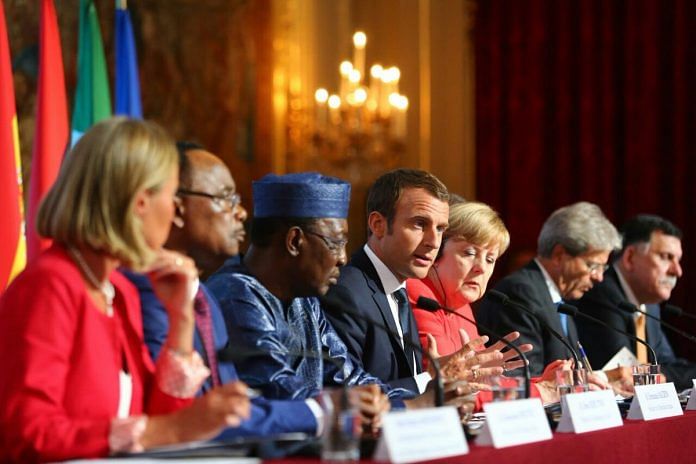European leaders seem to have found a way to prevent another African migration crisis
Will Nigeria and Chad be the anteroom for migrants who desire to live in Europe? Possibly. The leaders of France, Germany, Spain and Italy just met with those of Nigeria and Chad and sealed the deal to thwart the next big African crisis.
Instead of directly seeking asylum in Europe, “vulnerable” migrants would be screened and registered at reception centres in Africa. The European countries would give their African partners significant development aid in return. European leaders have long pushed for stronger patrolling in the Mediterranean, a crackdown on groups that enable trafficking and guarantees on tightened African border checks. So this meeting may have been a breakthrough of sorts of them. But migration advocates have already pointed out loopholes in the strategy. The promised development aid could simply amount to bolstering repressive regimes in Africa.
Iran to send a faith-healing mystic to the gallows
The founder of a mystical, New Age Shiite Islam will be sent to the gallows in Iran for “spreading corruption on earth”. His work has focused on faith-based healings and their understandings of the universe. “Humans are as extensive as the universe and are comprised of infinite parts,” he would say. Now, Mohammad Ali Taheri has been sentenced to death.
His critics – hardline clerics – argue that he has had illegitimate sexual relations with women. They call him a “false cleric” and his group a “deviant sect”. But his supporters won’t have any of it. “Many great people have gone to the scaffolds…He has stood by his beliefs. This proves his righteousness,” said a 27-year old follower. The good news for his supporters is the mystic is entitled to yet another appeal.
North Korea does it again, and Japan’s fuming
Days after Donald Trump said that Kim Jong Un had come to “respect” him, the North Korean leader may have very well delivered the most brazen provocation in his five-year long tenure. Threats and provocations are hardly aberrational under the Kim Jong Un regime, but by launching a ballistic missile flew right over a Japanese island, Pyongyang has upped the ante like never before.
Obviously, the Japanese were fuming. “Launching a missile and flying it over our country was a reckless act, and it represents a serious threat without precedent to Japan,” the Prime Minister said after winding up an emergency national security council meeting. He also had a 40-minute long conversation with Trump. While there was no immediate response from the White House, analysts are worried. “This is a much more dangerous style of test,” said a former East Asia official at the Pentagon.
US and Pakistan shouldn’t stop talking
Trump denounced Pakistan in his speech, the meeting between their foreign ministers was postponed, and now Pakistan has cancelled the visit of a senior US diplomat. But privately, they’re still talking.
In an interview, the senior-most American military commander in Afghanistan said that the issue of militant sanctuaries in Pakistan is “being addressed in private between the US government and the Pakistani government” – an indication of pragmatism on both sides. Soon after Donald Trump announced that his Afghanistan strategy would entail tightening the screws on Pakistan, a spate of knee-jerk diplomatic responses has unleashed between the two former allies. While the chasm between the US and Pakistan may now be out there, there is still scope for constructive dialogue. An ineradicable hostility between the two is in neither country’s interest.
Abu Dhabi’s female judges are making the judicial space more sensitive
In 2016, the Abu Dhabi government declared that both men and women could be judges in the emirate’s hitherto male-exclusive courts. A year later, there are eleven women working as judges in courts with a total of 592 female staff currently working with the Abu Dhabi Judicial Department.
The role of female judges or prosecutors is seen as particularly crucial in resolving criminal investigations, family disputes and children’s cases. As Abu Dhabi celebrated Emirati Women’s Day, the judicial department hailed the contributions of its women in making the judiciary more sensitive and accessible to women. “In the presence of mothers, sisters, daughters and other family members, women of the family feel more comfortable during an investigation when a female member of the prosecution interacts with them,” said the Director of Family Prosecution.
Compiled by Sanya Dhingra.



